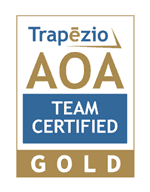Our patients love playing sports, from football to soccer to softball to lacrosse. Sports are healthy activities but not always safe. Those who wear braces need to take extra care not to get mouth injuries, which is why we recommend mouthguards for braces.
What does a mouthguard do? Can you wear braces and mouthguards? How should a mouthguard fit? These are just a few common questions Smith and Davis Orthodontics receives about mouthguards.
Mouthguards play an essential role in protecting your teeth during orthodontic treatment. Whether a football mouthguard for braces or a night guard for grinding teeth, they provide crucial protection and support for your smile.
Why Do You Need Mouthguards for Braces?
Imagine accidentally getting hit in the mouth by a football or baseball. Ouch! Ouch! This could leave you with a sore mouth and face, even in the best-case scenario. At worst, your teeth could cut your lips or cheeks, and you could even be knocked out.
Now imagine the damage with braces. While modern braces are smoother, a hard hit can still cut your lips, cheeks, or tongue, damage brackets, or break wires — potentially delaying your treatment.
Wearing a braces mouthguard protects your mouth and braces from damage, delays, and pain.

Can You Wear a Mouthguard With Braces?
A glance at some mouthguards may make you think that you can’t wear a mouthguard with braces. But you can find mouthguards for braces or have one made just for you.
Mouthguards can be worn with braces and should be worn in situations that could cause injury to your mouth or damage to your teeth. This includes more than just sports. Do you grind your teeth? You should wear a mouthguard for bruxism.
Which mouth guard for braces should you use? Let’s examine the different types of mouthguards for braces and other dental issues.
Types of Mouthguards
There are three types of mouthguards for sports with braces or without braces. The first is called the “boil and bite” and is available through major retailers. The second type is a professionally made mouthguard, usually ordered from a dentist or orthodontist. The third is a standard mouthguard that is made “as is.”
‘Boil and Bite’ Mouthguard
The boil-and-bite mouthguard is precisely as it sounds. You boil or microwave the mouthguard until it’s soft, then bite it to mold it around your teeth and braces. This leaves little space between the mouthguard and your teeth.
Most mouthguards are made to fit the upper teeth because they sit in front of the lower teeth. If you have an underbite, consider getting a mouthguard made for the lower teeth.
The most significant advantage of these mouthguards is that they can be remolded as your teeth shift. This allows for multiple adjustments before needing a replacement, lowering the cost of maintaining a mouthguard.
Your mouthguard may develop space between it and your shifted teeth. That means there’s a better chance of the mouthguard slamming into your teeth if you’re hit. Readjust your boil-and-bite mouthguard once you notice an improper fit.
Mouthguards protect teeth by fitting snugly and absorbing any shocks. Your mouthguard needs to fit correctly!
Professionally Made Mouthguards
These mouthguards are custom-made by a dentist or an orthodontist to fit precisely with your braces and teeth. These mouthguards cost more, but they may be covered by your insurance’s Health Savings Account (HSA) or Flex Spending Account (FSA).
A dentist or orthodontist digitally scans your teeth and braces to create a customized mouthguard. The process may take time, so make an appointment to have it done before you start your sports season.
The upside is you get a perfect fit. The downside is that fit won’t last long because your teeth will shift during braces treatment. Some mouthguards can be readjusted, but they must be replaced after a while.
This costs more money. A professional mouthguard is helpful if you play one sport all year. A boil-and-bite mouthguard can save you money if you play different sports all year.
Stock Mouthguard
A stock mouthguard is a ready-made option that requires little to no adjustment. While it’s a budget-friendly choice, its one-size-fits-all design often results in a poor fit and may not accommodate braces. We advise against using mouthguards that don’t provide a secure, proper fit.
Which mouth guard is right for you? We’ll happily discuss your options and help you decide which is best for you.

Night Guards for Teeth Grinding With Braces
Mouth guards for braces protect your mouth during sports. They can also protect your teeth and braces from teeth grinding, also called bruxism.
Teeth grinding can cause severe damage to your teeth. It can wear down your enamel rapidly and cause cracks, chips, and breaks. If you wear braces, bruxism can harm the bands on your back teeth. It can also damage the wires and brackets on your other teeth.
A night guard for teeth puts a barrier between your upper and lower teeth to prevent teeth-grinding. Unlike standard mouthguards for sports, a night guard repositions the jaw and tongue, making teeth-grinding more difficult.
A night guard for bruxism is an excellent choice if you grind your teeth while sleeping. It can also help if you do it daily without realizing it.

Can a Mouthguard Prevent Sleep Apnea and Snoring?
Some people have asked if their mouthguards can prevent sleep apnea or snoring. A sports mouthguard isn’t necessarily made for those tasks.
Instead, we recommend using a professional dental appliance to prevent tooth grinding or snoring. These devices are customized to your teeth and placed in a certain way to avoid clenching or snoring. A sleep apnea mouth guard is different from a regular sports mouthguard. It is made to fit your teeth perfectly. This gives you a secure and comfortable fit. This type of custom-fit mouthguard ensures optimal positioning of your jaw and tongue for adequate airway support.
These devices move your jaw forward, keeping your throat open and your tongue forward so they don’t obstruct your airway. This airway obstruction causes sleep apnea and snoring. Talk with Smith and Davis Orthodontics about the correct device to reduce snoring and sleep apnea.
How to Clean Your Mouth Guard
Your mouth guard plays a crucial role in protecting your teeth, but without proper care, it can become a breeding ground for bacteria and odors. A dirty mouth guard may lead to oral health issues, including bad breath and gum irritation. Regular cleaning helps maintain its effectiveness and keeps your smile healthy. Discover the best ways to clean your mouth guard here.
More on Mouthguards in Rogers, AR
Mouthguards are a great way to prevent injuries to braces or teeth during sports. We know our Rogers, AR, patients love sports, and we want to encourage them to play sports whenever possible. We’re happy to discuss mouthguards without patients. Schedule an appointment to see us today!






